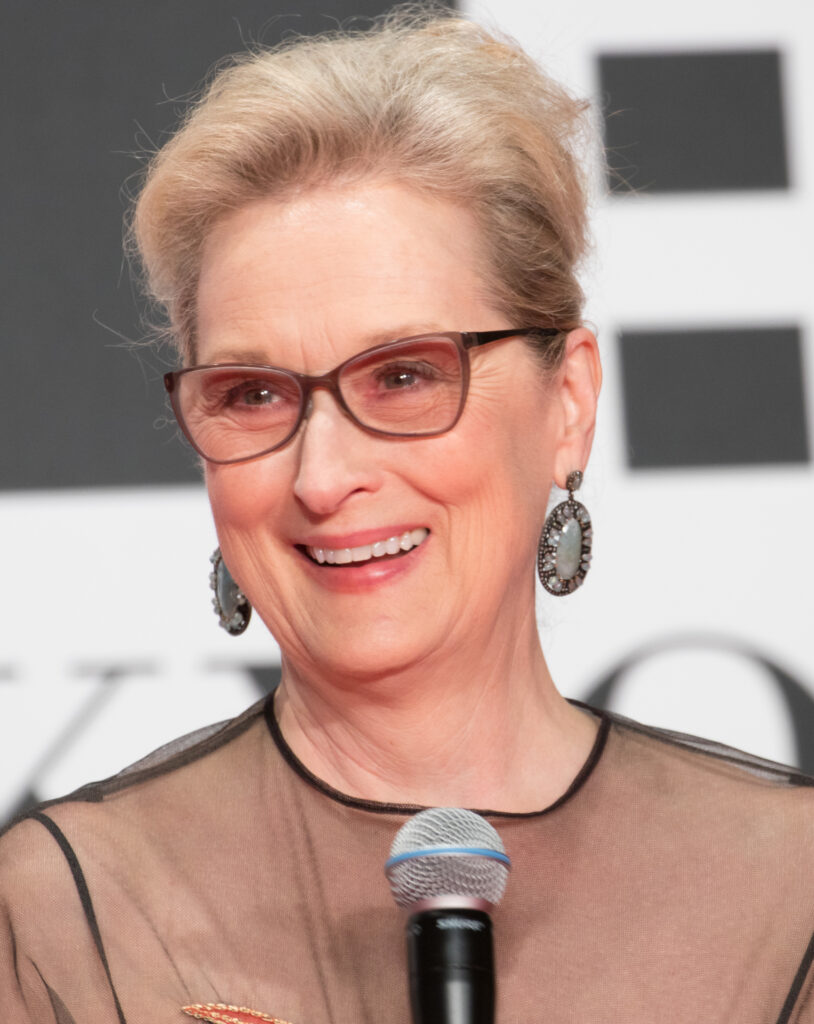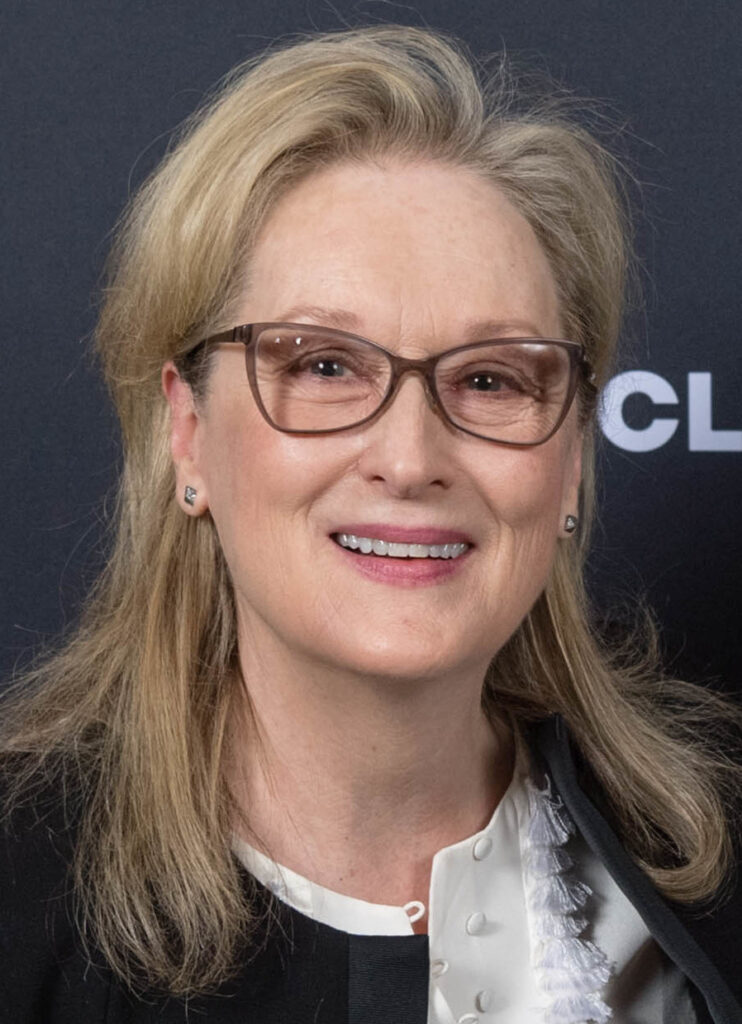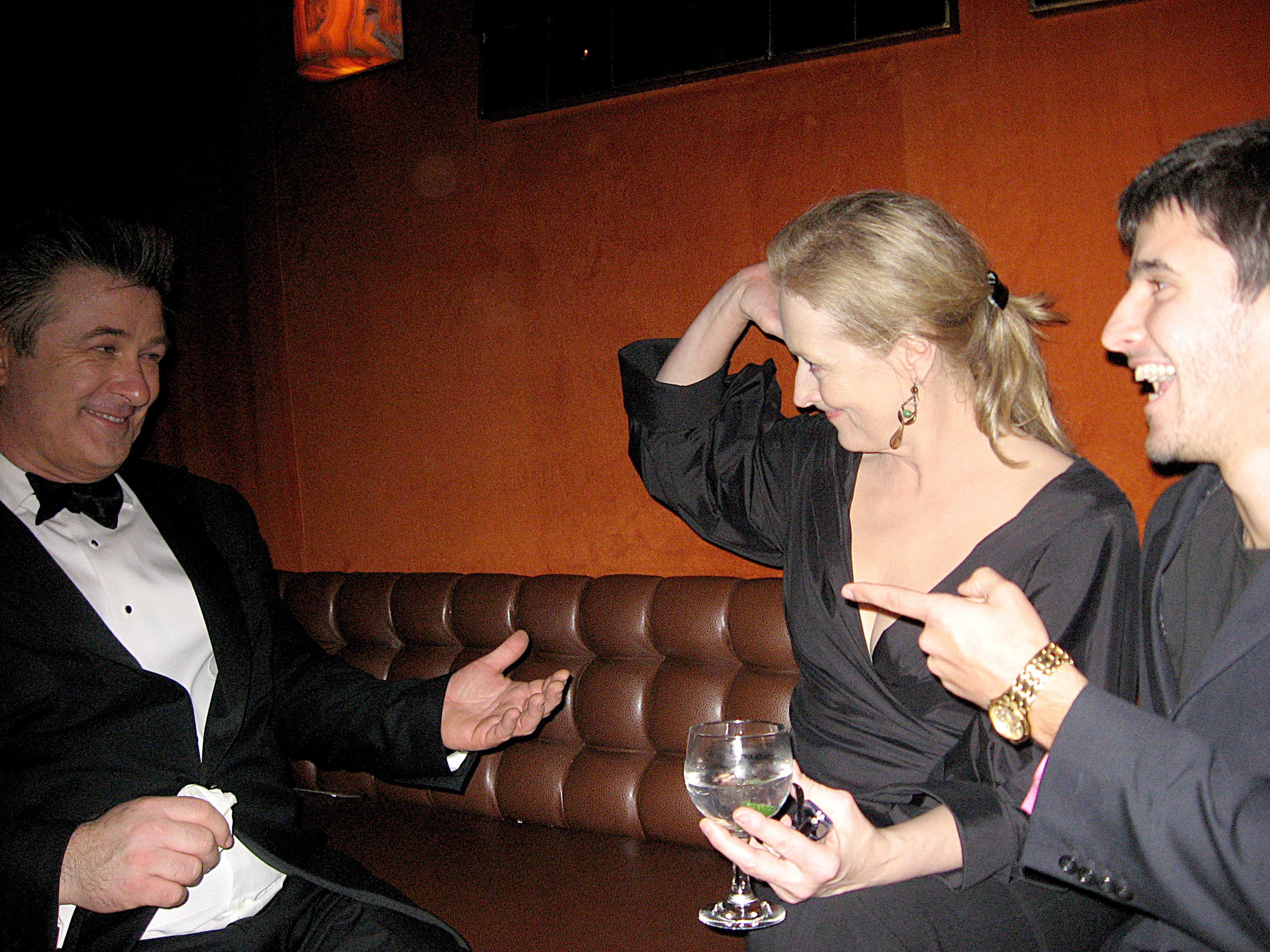
Meryl Streep. Just hearing the name evokes a sense of unparalleled artistry, a career spanning over five decades, and a collection of accolades that most actors can only dream of. With three Academy Awards, eight Golden Globes, and countless unforgettable performances, she stands as a towering figure in American cinema, often hailed as “the best actress of her generation.” But beyond the glittering trophies and critical acclaim, there’s a compelling narrative woven into the very fabric of her professional journey – a subtle yet profound philosophy that has shaped her iconic public image in a uniquely authentic way.
In an industry often obsessed with fleeting trends, superficial glamour, and meticulously curated personas, Streep has consistently carved a path rooted in substance, integrity, and an unwavering commitment to her craft. This isn’t about shunning designer labels entirely or making a statement with thrift store finds on the red carpet, though such choices could certainly align with the spirit. Instead, it’s about a deeper, more personal “frugality” – an economy of self, a resourcefulness in staying true to her intrinsic values, and a powerful refusal to be defined by external expectations or transient beauty standards. This approach, as we’ll explore, informs everything from her choice of roles to her interactions within the high-stakes world of Hollywood.
So, how does an actress of her stature navigate the relentless spotlight, especially when it comes to presenting herself to the world? It’s a question that invites us to look beyond the literal “red carpet looks” and delve into the enduring ethos that underpins Meryl Streep’s entire public presence. Her career serves as a powerful testament to the idea that true influence and lasting appeal come not from elaborate artifice, but from a profound and consistent commitment to authenticity, intellectual curiosity, and a relentless pursuit of honest storytelling. This journey reveals a woman who, time and again, chose depth over dazzle, challenging norms and offering a fresh perspective on what it means to be a powerful woman in the public eye.
1. **The Authentic Foundation: Early Life and Influences**Meryl Streep’s journey towards a grounded and authentic public image began long before the bright lights of Hollywood found her. Born Mary Louise Streep in 1949, she was raised in a supportive environment, with her artist mother, Mary Wilkinson Streep, playing a pivotal role in instilling confidence and a sense of capability. “She was a mentor because she said to me, ‘Meryl, you’re capable. You’re so great.’ She was saying, ‘You can do whatever you put your mind to. If you’re lazy, you’re not going to get it done. But if you put your mind to it, you can do anything.’ And I believed her.”
Despite this strong foundation, Streep’s early life wasn’t about cultivating a glamorous facade. Author Karina Longworth described her as a “gawky kid with glasses and frizzy hair,” highlighting a natural, perhaps even unconventional, appearance that she didn’t seem to shy away from, even while showing off for family home movies. This early self-acceptance, encouraged by her mother, hints at a developing comfort with her true self, rather than striving for an idealized image.
A telling anecdote from her youth further illustrates this inherent push for authenticity. At age 12, Streep was selected to sing at a school recital and took opera lessons. However, she quit after four years, remarking, “I was singing something I didn’t feel and understand. That was an important lesson—not to do that. To find the thing that I could feel through.” This early rejection of performance without genuine emotional connection foreshadowed a career built on deep feeling and understanding, a true north that would guide her choices in the decades to come, far removed from the superficial demands of outward appearance.
Read more about: Reese Witherspoon’s Journey: From Southern Roots to Hollywood Royalty and Beyond

2. **The Defining Rejection: The King Kong Audition**Perhaps one of the most defining moments that solidified Streep’s commitment to authenticity, even in the face of harsh industry judgments, occurred during an audition early in her career. Having been deeply impacted by Robert De Niro’s performance in 1976’s *Taxi Driver*, she began auditioning for film roles, including the lead in Dino De Laurentiis’s remake of *King Kong*. It was an unsuccessful audition, but the interaction itself became legendary, perfectly encapsulating her refusal to conform to superficial expectations.
As Streep stood before him, De Laurentiis, unaware that she understood Italian, turned to his son and remarked, “This is so ugly. Why did you bring me this?” His dismissive comment about her appearance, intended to be private, was met with a remarkable and immediate response. Streep, understanding every word, retorted, “I’m very sorry that I’m not as beautiful as I should be, but, you know – this is it. This is what you get.”
This powerful, unfiltered reply was more than just a moment of defiance; it was a declaration of self-acceptance and a rejection of the narrow beauty standards often imposed on actresses. It set a precedent for her career, signaling that her value lay in her talent and her genuine self, not in a producer’s subjective assessment of her looks. This iconic response became a cornerstone of her “frugal” approach to Hollywood, demonstrating a profound internal economy where self-worth was derived from within, rather than from external validation or a manufactured glamorous facade.

3. **Beyond Beauty Standards: Versatility and Character Depth**Following the *King Kong* incident, Meryl Streep embarked on a career that consistently defied easy categorization and celebrated versatility over a singular, marketable persona. A *New York magazine* article noted in 1981 that while many female stars of the past had “cultivated a singular identity in their films,” Streep was a “chameleon,” willing to play “any type of role.” This ability to morph into entirely different characters, rather than always “playing herself,” further illustrates her frugal approach to celebrity: she didn’t rely on a fixed, glamorous image, but on the transformative power of her acting.
Her career trajectory saw her effortlessly transition from the dramatic depths of a troubled wife in *Kramer vs. Kramer* to the intense portrayal of a Holocaust survivor in *Sophie’s Choice*, and later to the comedic brilliance of a fashion magazine editor in *The Devil Wears Prada*. This wide range of roles meant that audiences were always captivated by her characters, rather than a consistent Meryl Streep “look” or persona. She didn’t need to brand herself; her work did the talking.
This commitment to character depth over superficial glamour allowed Streep to break free from the restrictive molds often placed on actresses. She famously said, “I couldn’t help wishing that I was more beautiful” for *The French Lieutenant’s Woman*, yet she developed an English accent and delivered a performance that earned her a BAFTA. Her consistent focus on the internal life of her characters and her unparalleled ability to inhabit them fully became her most compelling “look” – one that transcends transient beauty standards and proves that authenticity and skill are the most valuable assets in Hollywood.
Read more about: Lucine Amara, 99, Dies; Soprano Stalwart at the Met Who Championed Rights and Artistry for Over Four Decades

4. **Challenging the Script: Advocating for Substance in Roles**Meryl Streep’s “frugal philosophy” isn’t just about her personal presentation; it extends to her deep commitment to the integrity of storytelling and the realistic portrayal of women on screen. Early in her film career, this was evident in her work on *Kramer vs. Kramer*. Cast opposite Dustin Hoffman as an unhappily married woman who abandons her husband and child, Streep felt that the initial script portrayed the female character as “too evil” and insisted that it was not representative of real women facing marriage breakdown and child custody battles.
Her dedication to challenging and revising the script for accuracy and nuance paid off. The makers agreed with her, and the script was revised, allowing her to craft a more complex and relatable character. In preparing for the part, Streep spoke to her own mother about her life as a wife with a career and observed interactions between parents and children, demonstrating her pursuit of genuine understanding. Director Robert Benton even allowed her to write her own dialogue in two key scenes, a testament to her profound insight into the character.
This advocacy for more authentic female characters was not an isolated incident. In *The Deer Hunter*, she took on the role of a “vague, stock girlfriend” to remain with John Cazale, who was battling lung cancer. Yet, author Longworth notes that Streep “Made a case for female empowerment by playing a woman to whom empowerment was a foreign concept–a normal lady from an average American small town, for whom subservience was the only thing she knew.” Even in seemingly subservient roles, Streep imbued her characters with an honesty and depth that challenged simplistic portrayals, always prioritizing the human truth over convenient narrative stereotypes.
5. **Craft Over Artifice: The Rejection of Special Effects**In an industry increasingly reliant on visual spectacle and technological enhancements, Meryl Streep made a definitive statement about her preference for the human element of performance over artificiality. Her experience with the farcical black comedy *Death Becomes Her* in 1992 proved to be a turning point, firmly cementing her “frugal” stance against excessive artifice in filmmaking. The seven-month shoot was the longest of her career, and it involved extensive special effects and prosthetics to age her character by ten years.
Despite the commercial success of the film, earning $15.1 million in just five days, Streep’s personal experience was far from enjoyable. She later admitted to having “disliked filming the scenes involving heavy special effects.” This dislike was so profound that it led to a clear, resolute decision: she “vowed never to work again on a film with heavy special effects.” This commitment speaks volumes about her priorities as an artist.
Streep’s rejection of heavy special effects underscores her consistent focus on authentic performance. For her, the essence of acting lies in human expression, emotion, and interaction, not in digital manipulation or elaborate makeup that obscures the actor’s craft. This particular “frugality” is not about saving money, but about preserving the integrity of her artistic process and ensuring that her contributions to film remain rooted in genuine human experience, valuing the nuanced subtlety of her acting over any technical dazzle.

6. **Empowerment in the Industry: Championing Women’s Roles**Meryl Streep’s influence extends far beyond her captivating performances; she has also been a vocal advocate for systemic change within Hollywood, particularly concerning the representation and opportunities for women. This commitment to a more equitable and realistic industry environment is another facet of her “frugal philosophy” – a focus on foundational fairness and substantive roles rather than merely personal gain or fleeting fame. She recognized early that the industry often downplayed the importance of women, both on screen and off.
In 1990, Streep keynoted the first national event of the Screen Actor’s Guild National Women’s Conference, using her platform to emphasize “the decline in women’s work opportunities, pay parity, and role models within the film industry.” This wasn’t just a casual remark; it was a strong, public critique of existing norms, challenging the status quo and advocating for an empowering and progressive narrative for women in Hollywood. Her words aimed to empower readers and industry professionals alike, offering fresh perspectives on systemic issues.
Her career choices themselves often mirrored this advocacy. She understood the limitations faced by actresses as they aged, commenting in a 1981 interview, “By the time an actress hits her mid-forties, no one’s interested in her anymore.” Yet, through her continued success and pivotal roles like in *The Bridges of Madison County*, she challenged this narrative, becoming “arguably the first middle-aged actress to be taken seriously by Hollywood as a romantic heroine.” This unwavering commitment to expanding the possibilities for women, both through her voice and her work, highlights a profound dedication to authenticity and substance, values that inherently shape her enduring public image and contribute to her unique approach to navigating the demands of celebrity.
Meryl Streep’s career isn’t just a parade of awards and critical acclaim; it’s a masterclass in how an artist can maintain integrity and profound relevance in an industry that constantly chases the next fleeting trend. Her initial refusal to conform was just the beginning. As we delve deeper, it becomes crystal clear that her ‘frugal way’ isn’t a temporary stance but a sustained, deliberate commitment to artistic truth and a public image rooted in genuine substance. This unwavering approach has not only defined her as an actress but has also carved a new path for what it means to be a lasting icon in Hollywood, consistently challenging and redefining norms along the way.

7. **The Nuance of Accents: Mastering Authenticity**One of the most celebrated aspects of Streep’s craft is her uncanny ability to master accents, seamlessly transforming her voice to inhabit countless characters. From the precise English lilt in *The French Lieutenant’s Woman* to the heart-wrenching Polish accent in *Sophie’s Choice*, or even the subtly distinct Australian intonation in *Evil Angels*, her vocal dexterity is legendary. Yet, what truly sets her apart isn’t just the technical skill, but the underlying reason *why* she dedicates herself to such linguistic authenticity.
For Streep, this isn’t about showing off a clever parlor trick or adding a superficial layer to a performance; it’s an essential, ‘frugal’ investment in the complete embodiment of a character’s truth. Every nuance in her vocal work serves to deepen the audience’s understanding of who these women are, where they come from, and the emotional landscape they navigate. It’s a testament to her commitment that she once commented on the Australian accent, stating, “I had to study a little bit for Australian because it’s not dissimilar [to American], so it’s like coming from Italian to Spanish. You get a little mixed up,” revealing the meticulous effort behind what appears effortless.
Her process goes beyond mere mimicry; it’s an act of profound empathy. Roger Ebert famously lauded her delivery in *Sophie’s Choice*, saying, “Streep plays the Brooklyn scenes with an enchanting Polish-American accent (she has the first accent I’ve ever wanted to hug), and she plays the flashbacks in subtitled German and Polish. There is hardly an emotion that Streep doesn’t touch in this movie, and yet we’re never aware of her straining.” This highlights how her accent work isn’t an external flourish, but an internal conduit, allowing her to channel the character’s lived experience directly to the viewer. It’s a powerful reminder that true mastery elevates the material, never overshadowing it.
Even in *Music of the Heart*, where her character Roberta Guaspari might seem to have no discernible ‘accent,’ Ebert shrewdly observed, “Here you might think she has no accent, unless you’ve heard her real speaking voice; then you realize that Guaspari’s speaking style is no less a particular achievement than Streep’s other accents.” This underscores her dedication to realism, not just in dramatic, obvious transformations, but in crafting even the subtlest vocal specificities to fully realize a character. Her voice, like her entire approach to acting, becomes a vessel for truth, never for vanity.

8. **Defying Ageism: Redefining Romantic Heroines**The landscape of Hollywood has historically been notoriously unkind to actresses as they age, often sidelining them from leading roles, especially romantic ones. Streep herself candidly articulated this harsh reality in a 1981 interview, observing, “By the time an actress hits her mid-forties, no one’s interested in her anymore.” However, in typical Meryl fashion, she didn’t just observe the problem; she actively dismantled it, brick by beautifully rendered brick, with her sustained career choices.
Her work, particularly the romantic drama *The Bridges of Madison County* (1995), served as a monumental pivot point, not just for her own career but for the entire industry’s perception of older actresses. In this film, Streep, then in her mid-forties, captivated audiences as Francesca, a middle-aged Italian farm wife embarking on an intense love affair. Biographer Longworth asserts that this role established Streep as “arguably the first middle-aged actress to be taken seriously by Hollywood as a romantic heroine.” It was a seismic shift, proving that emotional depth and mature romance were not only compelling but also immensely profitable.
This wasn’t a fluke; it was a conscious, sustained effort to challenge and redefine industry norms. Streep’s willingness to embrace complex, age-appropriate roles with honesty and vulnerability opened doors for countless women who followed. Her performances demonstrated that women’s stories, desires, and romantic journeys do not diminish with time but rather gain a richer, more profound texture. It’s an inspiring example of how one woman’s commitment to realism and character depth can have a ripple effect, empowering a generation and pushing Hollywood towards a more inclusive vision of beauty and love.
By continuing to take on roles that celebrated women’s lives at every stage, from the vibrant disco queen in *Mamma Mia!* to the entangled romantics in *It’s Complicated*, Streep consistently proved that magnetism and relatability are ageless. She didn’t just play characters; she championed them, giving voice and presence to narratives that had long been overlooked, thereby solidifying a legacy built on genuine representation and enduring appeal rather than fleeting youthful glamour.

9. **The Power of Transformation: Physicality for Character, Not Glamour**While Hollywood often demands that actresses maintain a certain idealized image, Meryl Streep’s approach to her physical appearance for roles has always been rooted in serving the character’s truth, rather than her own personal vanity. This is another profound example of her ‘frugal way,’ prioritizing the internal authenticity of a role over any external, superficial expectations of celebrity glamour. She famously put herself aside to become the women she portrayed.
Consider her preparation for *Silkwood* (1983), where she played the real-life nuclear whistleblower Karen Silkwood. Instead of focusing on replicating Silkwood’s outward appearance, Streep immersed herself in understanding the woman’s inner world. She met with people close to Karen, stating, “I didn’t try to turn myself into Karen. I just tried to look at what she did. I put together every piece of information I could find about her … What I finally did was look at the events in her life, and try to understand her from the inside.” This deep dive into character psychology, rather than surface-level mimicry, illustrates her core belief that authenticity comes from within.
Similarly, for *The Bridges of Madison County*, Streep made deliberate choices that diverged from conventional expectations. She gained weight for the part, ensuring her portrayal of Francesca felt grounded and real. Furthermore, she consciously chose to dress differently from the character’s description in the original novel, aiming to emulate “voluptuous Italian film stars such as Sophia Loren” and Anna Magnani. These choices weren’t about making herself more ‘glamorous’ in a generic sense, but about crafting a specific, culturally resonant physicality that brought depth and believability to Francesca’s journey.
This willingness to mold her own physique and presentation to inhabit a role fully, even if it meant stepping away from a conventionally ‘ideal’ image, speaks volumes. It’s a form of artistic selflessness that has characterized her career, showing that an actress’s most valuable asset is her ability to transform completely for the story, rather than projecting a fixed, glamorous persona. Her body becomes another instrument in her extensive repertoire, always at the service of character, never simply for show.

10. **Prioritizing Life: The Balance of Family and Career**In an industry that often demands near-absolute devotion and sacrifice, Meryl Streep has consistently demonstrated a pragmatic and deeply personal commitment to balancing her high-profile career with her family life. This aspect of her ‘frugal philosophy’ is perhaps one of the most relatable and empowering for many, showcasing a woman who prioritizes her intrinsic values even amidst the relentless pressures of Hollywood.
Streep consciously chose to limit her career options by prioritizing her home life, expressing a preference to work in Los Angeles, close to her family. This wasn’t a passive decision; it was an active choice that shaped her trajectory. She acknowledged this trade-off in a prescient 1981 interview, noting, “if you want to fit a couple of babies into that schedule as well, you’ve got to pick your parts with great care.” This insight reveals a strategic, resourceful approach to career management, where personal values dictate professional choices, rather than the other way around.
This deliberate curation of her work-life balance is a powerful statement, particularly for women in demanding careers. It demonstrates that success doesn’t always have to come at the expense of a fulfilling personal life. By being selective and making conscious choices about where and how she worked, Streep carved out a space where she could excel artistically without sacrificing her deeply held commitment to her loved ones.
Her ability to navigate the complexities of a demanding career while maintaining a strong family foundation underscores a profound self-awareness and integrity. It’s an inspiring example of how true ‘frugality’ can extend to one’s most precious resource – time – allocating it wisely to nurture both professional aspirations and personal happiness. This commitment to her whole self, rather than just her public persona, has undoubtedly contributed to her grounded and relatable public image.
Read more about: Nicole Kidman’s Unveiled Truth: Navigating Devastating Changes Amid Keith Urban Divorce, and the Lessons of a ‘Skinless’ Life

11. **Beyond the Screen: Sustained Advocacy for Industry Change**Meryl Streep’s influence isn’t confined to her captivating performances; she has leveraged her considerable platform to advocate for systemic change within the entertainment industry, particularly concerning the opportunities and representation for women. This commitment to a more equitable and realistic Hollywood environment is a crucial element of her ‘frugal philosophy,’ focusing on foundational fairness and substantive reform rather than merely personal gain or fleeting fame.
As early as 1990, Streep used her voice to challenge the status quo, delivering the keynote address at the first national event of the Screen Actor’s Guild National Women’s Conference. Here, she pointedly highlighted “the decline in women’s work opportunities, pay parity, and role models within the film industry.” This wasn’t just a casual observation; it was a powerful, public critique of ingrained gender imbalances, pushing for an empowering and progressive narrative for women in a sector notorious for its biases.
Her words resonated deeply, aiming to empower both her peers and industry professionals alike, offering fresh perspectives on these pervasive systemic issues. She didn’t shy away from directly criticizing the film industry for “downplaying the importance of women both on screen and off,” a courageous stand that underscored her unwavering dedication to fundamental fairness and intellectual honesty over maintaining a comfortable silence.
This sustained advocacy, woven throughout her career, demonstrates that her ‘frugality’ extends to her moral capital – spending it wisely to champion causes that truly matter. It shows a commitment to not just excelling personally, but also to improving the very landscape in which she thrives, ensuring that her legacy is not just about brilliant acting, but about catalyzing meaningful, lasting change for women in Hollywood and beyond.
Read more about: Beyond the Script: 10 Jaw-Dropping Real-Life Incidents That Shaped Harrison Ford’s Legendary Persona

12. **An Enduring Legacy: The Power of Authenticity in Icon Status**Meryl Streep’s unique “frugal way” — her unwavering commitment to authenticity, substance, and challenging norms over superficial glamour — has not only defined her extraordinary career but has also forged an iconic and enduring public legacy unlike any other. Her trajectory stands as a powerful counter-narrative to the fleeting nature of celebrity, demonstrating that true icon status is earned through consistent integrity and a profound dedication to craft.
While she was hailed as “A Star for the 80s” and featured on *Newsweek* covers, Streep famously denounced “excessive hype,” indicating her discomfort with the manufactured aspects of fame. Jack Kroll’s observation that “There’s a sense of mystery in her acting; she doesn’t simply imitate… She transmits a sense of danger, a primal unease lying just below the surface of normal behavior” speaks to her inherent focus on depth, ensuring she “never seemed to play herself” but rather fully inhabited her characters.
This relentless pursuit of artistic truth has garnered her a collection of honorary awards that speak volumes about her standing in global culture. From an Honorary César in 2003, the AFI Life Achievement Award in 2004, and the Kennedy Center Honor in 2011, to an Honorary Golden Bear in 2012, the Golden Globe Cecil B. DeMille Award in 2017, and the Honorary Palme d’Or in 2024 – these accolades are more than mere trophies. They are tributes to an artist whose contributions transcend entertainment, touching on universal human experiences with unparalleled honesty.
Furthermore, her recognition by national leaders, receiving the National Medal of Arts in 2010 and the Presidential Medal of Freedom in 2014 from President Barack Obama, and being made a Commander of the Order of Arts and Letters by the French government in 2003, highlights her cultural significance far beyond the silver screen. These honors underscore how her work, rooted in realism and human depth, has profoundly impacted society and artistic discourse worldwide.
Ultimately, Meryl Streep’s legacy is a testament to the power of staying true to oneself, to one’s art, and to one’s values. Her frugal approach isn’t about saving money, but about economizing on superficiality and investing every ounce of her prodigious talent into the substance of her work and the integrity of her voice. It’s a timeless lesson for anyone navigating a world obsessed with appearances: true greatness, and indeed true glamour, comes from within, cultivated through authenticity and a relentless pursuit of the real.
Read more about: From Pennies to Masterpieces: 14 Low-Budget Films That Rose to Timeless Classic Status
In an age where the curated image often eclipses genuine substance, Meryl Streep reminds us that the most enduring ‘looks’ are not found on a red carpet, but forged in the depths of character, integrity, and an unwavering commitment to the truth. Her career is a blueprint for living meaningfully, proving that the most valuable assets are the ones you carry within, always in style, always profound.” , “_words_section2”: “1965





